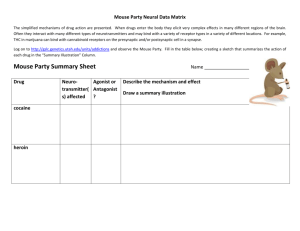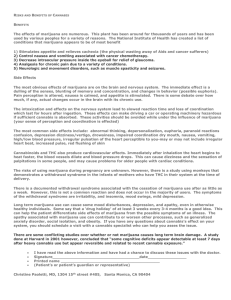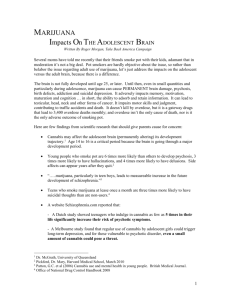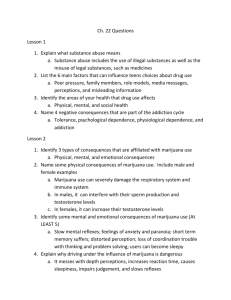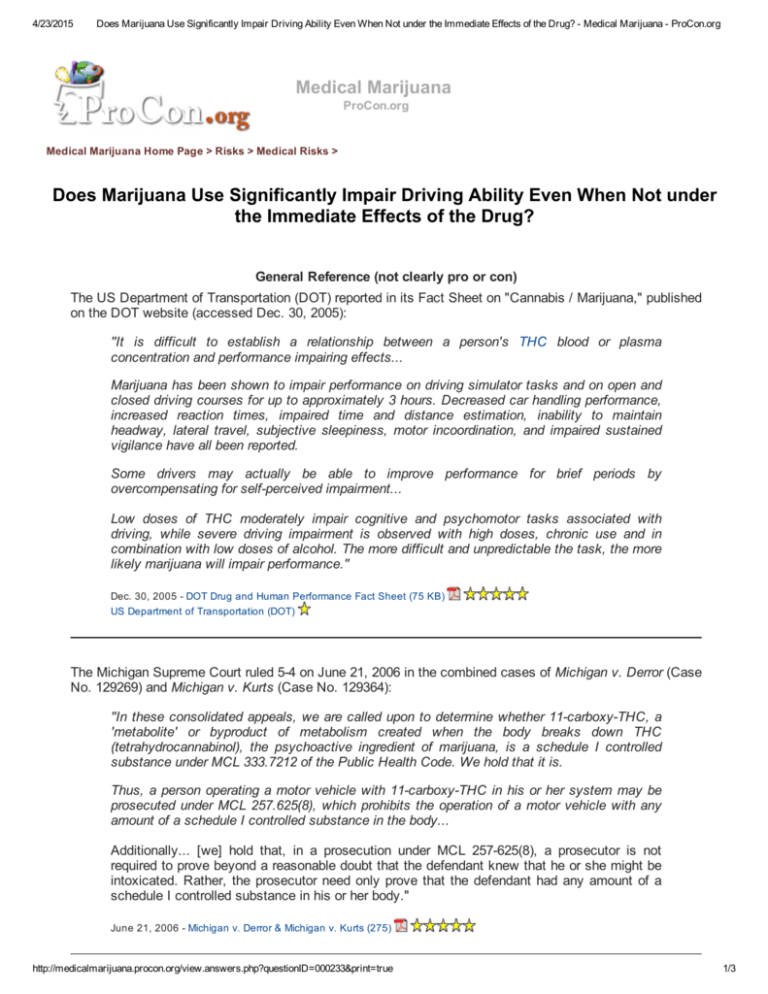
4/23/2015
Does Marijuana Use Significantly Impair Driving Ability Even When Not under the Immediate Effects of the Drug? ­ Medical Marijuana ­ ProCon.org
Medical Marijuana ProCon.org
Medical Marijuana Home Page > Risks > Medical Risks >
Does Marijuana Use Significantly Impair Driving Ability Even When Not under
the Immediate Effects of the Drug?
General Reference (not clearly pro or con)
The US Department of Transportation (DOT) reported in its Fact Sheet on "Cannabis / Marijuana," published
on the DOT website (accessed Dec. 30, 2005):
"It is difficult to establish a relationship between a person's THC blood or plasma
concentration and performance impairing effects...
Marijuana has been shown to impair performance on driving simulator tasks and on open and
closed driving courses for up to approximately 3 hours. Decreased car handling performance,
increased reaction times, impaired time and distance estimation, inability to maintain
headway, lateral travel, subjective sleepiness, motor incoordination, and impaired sustained
vigilance have all been reported.
Some drivers may actually be able to improve performance for brief periods by
overcompensating for self­perceived impairment...
Low doses of THC moderately impair cognitive and psychomotor tasks associated with
driving, while severe driving impairment is observed with high doses, chronic use and in
combination with low doses of alcohol. The more difficult and unpredictable the task, the more
likely marijuana will impair performance."
Dec. 30, 2005 ­ DOT Drug and Human Performance Fact Sheet (75 KB) US Department of Transportation (DOT) The Michigan Supreme Court ruled 5­4 on June 21, 2006 in the combined cases of Michigan v. Derror (Case
No. 129269) and Michigan v. Kurts (Case No. 129364):
"In these consolidated appeals, we are called upon to determine whether 11­carboxy­THC, a
'metabolite' or byproduct of metabolism created when the body breaks down THC
(tetrahydrocannabinol), the psychoactive ingredient of marijuana, is a schedule I controlled
substance under MCL 333.7212 of the Public Health Code. We hold that it is.
Thus, a person operating a motor vehicle with 11­carboxy­THC in his or her system may be
prosecuted under MCL 257.625(8), which prohibits the operation of a motor vehicle with any
amount of a schedule I controlled substance in the body...
Additionally... [we] hold that, in a prosecution under MCL 257­625(8), a prosecutor is not
required to prove beyond a reasonable doubt that the defendant knew that he or she might be
intoxicated. Rather, the prosecutor need only prove that the defendant had any amount of a
schedule I controlled substance in his or her body."
June 21, 2006 ­ Michigan v. Derror & Michigan v. Kurts (275) http://medicalmarijuana.procon.org/view.answers.php?questionID=000233&print=true
1/3
4/23/2015
Does Marijuana Use Significantly Impair Driving Ability Even When Not under the Immediate Effects of the Drug? ­ Medical Marijuana ­ ProCon.org
Does Marijuana Use Significantly Impair Driving Ability
Even When Not under the Immediate Effects of the Drug?
PRO (yes)
CON (no)
Stephen J. Heishman, PhD, Research Psychologist
at the National Institute on Drug Abuse (NIDA),
presented the following at the 1995 National
Conference on Marijuana Use:
Accident Analysis & Prevention, a peer­reviewed
journal, reported in its July 2004 article titled
"Psychoactive Substance Use and the Risk of
Motor Vehicle Accidents," by K.L.L. Movig, et al.:
"Driving and marijuana do not mix;
that's the bottom line. "The objective of this study was to
estimate the association between
psychoactive drug use and motor
vehicle accidents requiring
hospitalization.
The data from these laboratory studies
show that marijuana impairs balance
and coordination ­­ functional
components important to driving ­­ in a
dose­related way. These effects may
be related to reported marijuana­
induced impairment of automobile
driving."
The risk for road trauma was increased
for single use of benzodiazepines and
alcohol... High relative risks were
estimated for drivers using
combinations of drugs and those using
a combination of drugs and alcohol.
Increased risks, although not
statistically significant, were assessed
for drivers using amphetamines,
cocaine, or opiates. 1995 ­ Stephen J. Heishman, PhD The Canadian Public Health Administration (CPHA)
stated in its Nov. 21, 2005 internet "The Pot and
Driving Campaign":
"Drugs that can help reduce the
symptoms of a disease can also affect
a person's ability to drive safely. That
is why some prescription drugs come
with warnings not to drive for a certain
amount of time after taking them.
Cannabis impairs driving skills most
severely during what is known as the
acute phase, which typically lasts for
up to 60 minutes after smoking.
No increased risk for road trauma was
found for drivers exposed to cannabis."
July 2004 ­ Accident Analysis & Prevention The International Association for Cannabis as
Medicine (IACM) reported in its presentation
"Developing Science­Based Per Se Limits for
Driving Under the Influence of Cannabis: Finding
and Recommendations by an Expert Panel,"
presented Sep. 2005 at the 3rd Conference on
Cannabinoids in Medicine:
That is followed by post­acute (the
phase after the acute one) and residual
phases. The residual phase is 150
minutes or more after smoking
[marijuana], during which impairment
subsides rapidly. The degree of impairment during the
residual phase depends on the amount
of THC consumed. After smoking a
so­called typical dose (about 20 mg) of
THC, the residual phase lasts 2­3
hours."
Nov. 21, 2005 ­ Canadian Public Health
Association (CPHA) http://medicalmarijuana.procon.org/view.answers.php?questionID=000233&print=true
"Even frequent users of cannabis do
not seem to have a higher accident risk
than non­users, as long as they are not
under the acute influence of the drug,
i.e. there appear to be no extended
effects of cannabis use on traffic
safety beyond the period of acute
impairment... Most studies found no effect of
cannabis on psychomotor function after
4 hours... a waiting period of about
three hours after smoking a medium to
strong social dose (15­20 mg) will be
sufficient to reduce a driver's
impairment."
2/3
4/23/2015
Does Marijuana Use Significantly Impair Driving Ability Even When Not under the Immediate Effects of the Drug? ­ Medical Marijuana ­ ProCon.org
Oakley Ray, PhD, Emeritus Professor of
Psychology and Pharmacology at Vanderbilt
University, and Charles Ksir, PhD, Professor of
Psychology at the University of Wyoming, wrote in
their 2004 textbook Drugs, Society, and Human
Behavior:
"In everyday use while intoxicated, the
marijuana user is unable to easily
recall information he or she learned just
seconds or minutes before...
Sep. 2005 ­ International Association for
Cannabinoid Medicines The National Association for the Reform of
Marijuana Laws (NORML) wrote in an Aug. 26, 2005
article titled "You Are Going Directly to Jail," by
Paul Armentano, NORML Senior Policy Advisor:
"Unlike with alcohol, the accidental risk
caused by cannabis ­­ particularly
among those who are not acutely
intoxicated ­­ appears limited because
subjects under its influence are
generally aware of their impairment and
compensate to some extent, such as
by slowing down and by focusing their
attention when they know a response
will be required."
[A]lthough reaction time is not greatly
affected, if affected at all, there is a
great impairment in the ability to
engage in tracking behavior, such as
keeping a pointer on a spot on a
rotating turntable... Behaviorally, the intoxication produced
by marijuana does present some
danger, especially if the user is
driving."
Aug. 26, 2005 ­ National Organization for the
Reform of Marijuana Laws (NORML) 2004 ­ Oakley Ray, PhD Charles Ksir, PhD The US Drug Enforcement Administration (DEA)
stated in its website publication "Exposing the Myth
of Medical Marijuana," (accessed Dec. 19, 2005):
"Marijuana affects many skills required
for safe driving: alertness, the ability to
concentrate, coordination, and reaction
time.
These effects can last up to 24 hours
after smoking marijuana."
Dec. 19, 2005 ­ US Drug Enforcement
Administration (DEA) ©ProCon.org, a 501(c)(3) nonprofit
All rights reserved
233 Wilshire Blvd., Suite 200, Santa Monica, CA 90401
Tel: 310­451­9596 Fax: 310­393­2471
http://medicalmarijuana.procon.org/view.answers.php?questionID=000233&print=true
3/3


![[H1]Researching Society with MicroCase Online](http://s3.studylib.net/store/data/007737973_2-9d35b9e42208c660471ccaa373bd3b78-300x300.png)
